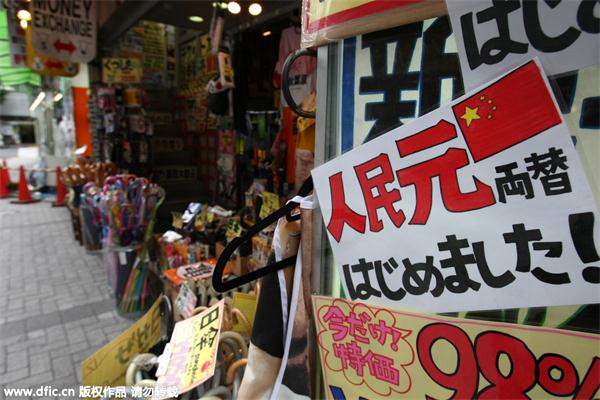 |
|
Chinese visitors shop in Akihabara district area on June 19, 2015, Tokyo, Japan. According to figures from the Japan National Tourism Office a total of 1,764,700 million foreigners visited Japan in April, up 43.3% from the same period last year. [Photo/IC] |
The food court at a popular market in Naha, Okinawa was full of people speaking Chinese, and some of the waitresses and waiters were speaking Chinese, too, and for a moment, I had the distinct impression I was back in China.
When I left, a local taxi driver told me that Naha is planning to build a large statue of a dragon, a symbol of China, on a hill to greet the cruise ships that arrive carrying large numbers of Chinese tourists.
Japan is Chinese travelers' most popular destination, with 2.05 million Chinese nationals granted visas in 2014. Japan's embassy in Beijing and its consulates in Shanghai and Guangzhou were its top three visa issuing missions, according to the country's foreign ministry. All its other consulates in China were also in the top 10.
Most of Chinese visitors head to Japan for shopping. In 2014, spending by Chinese tourists was up 10.3 percent year-on-year, amounting to almost $2,000 per person.
It is no wonder that Japan was excited about a travel account surplus of 209.9 billion yen ($1.7 billion), the first in 55 years. Its finance ministry highlighted the part the influx of Chinese tourists played.
Chinese tourists don't have to like Japan's Prime Minister Shinzo Abe and his policy toward China, but his economic policy, known as Abenomics, makes Japan an alluring destination.
Along with eased visa requirements and a weak yen, Japan's expansion of its consumption tax exemption to food products and cosmetics last fall has attracted even more Chinese.
There is no doubt, Japan's languishing economy is getting a boost from the large influx of Chinese travelers. As Japan's population ages and declines, the world's No 3 economy is becoming increasingly dependent on the consumer spending by those who live outside the country. And Tokyo knows it. Abe wants to make tourism one of the main engines driving Japan's economic growth by opening more duty-free shops and expediting immigration and customs procedures.
The number of Japanese travelers increased sharply from 4 million in the mid-1980s to 16 million in 1990s, when the Japanese economy grew rapidly: Its per capita GDP increasing from $10,000 to $35,000.
The same thing is happening in China, but at a faster rate.
Thanks to years of rapid growth, China had 4 million millionaire households in 2014, the second-largest number in the world after the United States, according to the US-based research from Boston Consulting Group. The China Rich List 2015 compiled by the US business magazine Forbes shows that China accounts for a record 20 percent of all billionaires in the world, up from 17.6 percent in 2014. The magazine's April report said China's mainland was estimated to have a record 400 billionaires and billionaire families thanks to "a rally in stock prices".
In 2014 alone, Chinese visitors spent $164 billion abroad, making them the world's biggest vacation spenders.
More Chinese tourists are expected to swarm into Japan. China, Japan and South Korea held talks on April 12 to boost the three countries' tourism, aiming to increase the visitor numbers among them to up to 30 million in 2020, from about 20 million in 2014.
Chinese travelers' shopping sprees in Japan should remind China's producers to work hard to produce quality goods, and remind Abe that another downturn in relations would make some Chinese tourists think again about their holiday destination.
The author is China Daily's Tokyo bureau chief. caihong@chinadaily.com.cn

I’ve lived in China for quite a considerable time including my graduate school years, travelled and worked in a few cities and still choose my destination taking into consideration the density of smog or PM2.5 particulate matter in the region.